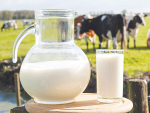Takeaway figures from last week’s Global Dairy Trade (GDT) auction shows demand for dairy in China is picking up, albeit at a slow pace.
Westpac head of NZ strategy Imre Speizer noted that last week’s auction was expected to be the first to be significantly affected by the coronavirus outbreak, with global containment measures accelerating in early March. However, the 3.9% fall in the GDT price index was of a similar magnitude to the three previous auction falls (-4.7%, -2.9%, and -1.2%).
Since the outbreak gripped global financial markets in late January, whole milk powder prices have fallen 13.5%.
Speizer says this decline is more moderate than that seen for other globally traded commodities, for example sugar -31%, wheat -17%, copper -17%, US lumber -30%. Brent crude oil has been an extreme case, plunging 59%.
“The evidence to date is that during this pandemic, dairy commodities have outperformed most major commodities, perhaps a testament to demand for core foods with health properties,” he says.
NZ’s key export product, whole milk powder, fell 4.2% -- a much smaller fall than futures market predictions of a 9%-11% drop. At US$2797/metric tonne, WMP is at its lowest level since January 2019. The low point of the past few years was $2599 in November 2018.
Skimmed milk powder prices fell 8.1%, butter rose 0.3%, anhydrous milk fats rose 1.0% (despite volumes being increased due to higher South Island production), and cheddar cheese rose 2.6%.
Last week’s GDT regional breakdown shows North Asian demand (a proxy for China demand) bounced back from a weaker showing at the previous auction.
Speizer says this is consistent with data showing new virus cases inside China have slowed significantly, as well as anecdotes of economic activity in China starting to normalise.
Rabobank’s senior dairy analyst Emma Higgins agrees that China is displaying “signs of dairy demand spluttering back to life”
However, Higgins points out that much of this increase is recovering lost ground seen in prior GDT Events.
Total Chinese demand in this GDT is still lower by almost 20% year-on-year.
Rabobank expects the ongoing impacts of the virus, in combination with a build-up of milk powder stocks and a lift in Chinese milk production, will result in a 19% fall in Chinese dairy import volume in 2020.



















